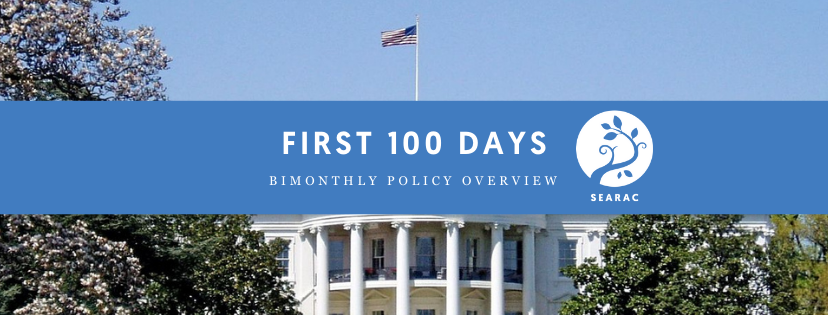April 8, 2021 IN: Education, Health, Immigration, National
First 100 Days – Bimonthly Policy Recap (April 7)

We are drawing closer to the Biden Administration’s 100th day in office, and SEARAC is committed to sharing updates on policies and actions that impact Southeast Asian Americans. If you have questions or want to learn more about any of the policies that SEARAC is tracking, contact National Policy Director Kham Moua at kham@searac.org.

Join our team as our new Education Policy Manager
 The Southeast Asia Resource Action Center (SEARAC) seeks a full-time Education Policy Manager to lead our national education advocacy activities through policy analysis, advocacy, and coalition building. The position’s key goals include building key policy champions on the national level, as a representative of SEARAC and through partner coalitions, to advance education equity for Southeast Asian Americans (SEAAs) and other marginalized students.The ideal candidate will have a proven ability to foster engagement among diverse, even competing groups, ranging from policy makers to local partners. They should be an exceptionally quick learner, thrive in a collaborative environment, and be able to work both independently and as part of a team. The ideal candidate will have experience in education policy, advocacy, or organizing. The candidate should also have experience analyzing legislation, generating policy solutions, and working productively in coalitions and partnerships. This position is based in Washington, D.C.
The Southeast Asia Resource Action Center (SEARAC) seeks a full-time Education Policy Manager to lead our national education advocacy activities through policy analysis, advocacy, and coalition building. The position’s key goals include building key policy champions on the national level, as a representative of SEARAC and through partner coalitions, to advance education equity for Southeast Asian Americans (SEAAs) and other marginalized students.The ideal candidate will have a proven ability to foster engagement among diverse, even competing groups, ranging from policy makers to local partners. They should be an exceptionally quick learner, thrive in a collaborative environment, and be able to work both independently and as part of a team. The ideal candidate will have experience in education policy, advocacy, or organizing. The candidate should also have experience analyzing legislation, generating policy solutions, and working productively in coalitions and partnerships. This position is based in Washington, D.C.
Salary range $60,000 – $70,000 dependent upon experience.
Apply by April 16 for priority consideration.

SEARAC endorses AANHPI history bill
Congresswoman Grace Meng (NY) reintroduced the Teaching Asian Pacific American History Act, a bill that would require federal grant applicants and recipients for teaching civics education to include Asian Pacific American (APA) history as part of their American history programs. The bill would also affirm that APA history is American history in tests administered for the National Assessment of Educational Progress, a nationally representative assessment by the US Department of Education of how students are doing academically. SEARAC is proud to endorse this bill because learning about our own and each other’s histories is critical to cross-racial and cross-ethnic understanding and solidarity. We call on Congress to support this bill and on states to take stronger steps to invest in Asian American Native Hawaiian and Pacific Islander (AANHPI) communities by supporting curricula that represent all students and creating opportunities for schools to embed AANHPI experiences into all levels of education. Learn more about the bill.
Biden administration expands student debt relief
The US Department of Education (ED) has expanded relief for additional groups of student borrowers. On Mar. 29, ED announced that borrowers whose loan debts were discharged because of total and permanent disability would not be required to submit earnings documentation during the COVID-19 emergency, applied retroactively to Mar. 13, 2020. ED will also reverse the reinstatement of loans that happened during the pandemic for these borrowers because they did not submit their earnings information, which was required prior to the pandemic. On Mar. 30, ED expanded the ongoing pause on student loan interest and repayment on federally held loans to include borrowers under the Federal Family Education Loan Program whose loans have defaulted. SEARAC applauds these steps by the Biden administration to support student borrowers during the COVID-19 emergency.We also call on President Biden to immediately cancel student debt to help all people who simply wanted to pursue higher education and provide economic relief and stimulus.

ACA Marketplace features lower costs, extended enrollment
The ACA marketplace now includes plans with lower costs. The American Rescue Plan generally decreased premiums for millions of Americans, so even if you weren’t eligible for plans with a lower cost before, you may be eligible now. The marketplace enrollment period has also been extended until Aug. 15. Specifically:
- If you were eligible for a premium tax credit before, you may now be eligible for an even lower premium.
- After applying the premium tax credit, those in the lowest income brackets can now get a $0-premium benchmark plan. Additionally, people who received unemployment benefits in 2021 can also get this plan.
- If your household income is within the middle income range, and you were previously ineligible for assistance, you may now be eligible for premium tax credits. This is because the American Rescue Plan caps premium payments to 8.5% of an individual’s or household’s income.
However, lower premiums are not automatically applied to your current plan. In order to access these benefits, you must enroll for a plan or change your current plan in the marketplace after April 1.

SEARAC endorses Dignity for Detained Immigrants Act
In late March, Rep. Pramila Jayapal (WA-07), Sen. Cory Booker (D-NJ), and Rep. Adam Smith (WA-09) reintroduced the Dignity for Detained Immigrants Act in the House and Senate. If passed, the bill would reform a significant portion of the US immigrant detention system, including scaling back detention centers, requiring better treatment of those housed in these facilities, and ending mandatory detention. SEARAC endorsed it because it is one of the primary pieces of legislation addressing the mass incarceration of immigrants and refugees. Many Southeast Asian refugees continue to be arrested and detained by Immigration and Customs Enforcement; many are detained for months, with some being held for years. Enacting this bill would help some of those individuals receive significantly better treatment.

President Biden responds to anti-Asian hate
On March 31, the White House released a fact sheet announcing actions taken by the Biden Administration to address the rise in anti-Asian hate. The actions identified in the announcement include reestablishing the White House Initiative on Asian Pacific Americans, allocating funding for AANHPI survivors of domestic and sexual abuse, and funding research into combatting anti-Asian violence and xenophobia, among others. SEARAC applauds President Biden for taking concrete steps to address the rise in hate against our communities, but we urge the Administration to also address the state violence inflicted on Southeast Asian American communities through continuous deportations of our family members. The SEARAC team remains committed and continues to advocate for a holistic approach to ending hate, including deep investments into community oriented, restorative justice programs, and funding ethnic studies.




